- Home
- H. Rider Haggard
King Solomon's Mines (Barnes & Noble Classics Series) Page 5
King Solomon's Mines (Barnes & Noble Classics Series) Read online
Page 5
“ ‘Ay,’ said Evans, ‘but I will tell you a queerer thing than that;’ and he went on to tell me how he had found in the far interior a ruined city, which he believed to be the Ophir of the Bible,3 and, by the way, other more learned men have said the same long since poor Evans’ time. I was, I remember, listening open-eared to all these wonders, for I was young at the time, and this story of an ancient civilisation and of the treasure which those old Jewish or Phoenician adventurers used to extract from a country long since lapsed into the darkest barbarism took a great hold upon my imagination, when suddenly he said to me, ”Lad, did you ever hear of the Suliman Mountains up to the north-west of the Mashukulumbwe country?” I told him I never had. “Ah, well,” he said, “that was where Solomon really had his mines, his diamond mines, I mean.”
4 “ ‘How do you know that?’ I asked.
“ ‘Know it; why what is “Suliman” but a corruption of Solomon!i and, besides, an old Isanusi (witch doctor) up in the Manica country 5 told me all about it. She said that the people who lived across those mountains were a branch of the Zulus, speaking a dialect of Zulu, but finer and bigger men even; that there lived among them great wizards, who had learnt their art from white men when ‘all the world was dark,’ and who had the secret of a wonderful mine of ”bright stones.“’
“Well, I laughed at this story at the time, though it interested me, for the diamond fields were not discovered then, and poor Evans went off and got killed, and for twenty years I never thought any more of the matter. But just twenty years afterwards—and that is a long time, gentlemen, an elephant hunter does not often live for twenty years at his business—I heard something more definite about Suliman’s Mountains and the country which lies beyond it. I was up beyond the Manica country at a place called Sitanda’s Kraal,j and a miserable place it was, for one could get nothing to eat there, and there was but little game about. I had an attack of fever, and was in a bad way generally, when one day a Portugee arrived with a single companion—a half-breed. Now I know your Delagoa Portugee6 well. There is no greater devil unhung in a general way, battening as he does upon human agony and flesh in the shape of slaves. But this was quite a different type of man to the low fellows I had been accustomed to meet; he reminded me more of the polite dons I have read about. He was tall and thin, with large dark eyes and curling grey moustachios. We talked together a little, for he could speak broken English, and I understood a little Portugee, and he told me that his name was José Silvestre, and that he had a place near Delagoa Bay; and when he went on next day with his half-breed companion, he said, ‘Good-bye,’ taking off his hat quite in the old style. ‘Good-bye, senor,’ he said; ‘if ever we meet again I shall be the richest man in the world, and I will remember you.’ I laughed a little—I was too weak to laugh much—and watched him strike out for the great desert to the west, wondering if he was mad, or what he thought he was going to find there.
“A week passed, and I got the better of my fever. One evening I was sitting on the ground in front of the little tent I had with me, chewing the last leg of a miserable fowl I had bought from a native for a bit of cloth worth twenty fowls, and staring at the hot red sun sinking down into the desert, when suddenly I saw a figure, apparently that of a European, for it wore a coat, on the slope of the rising ground opposite to me, about three hundred yards away. The figure crept along on its hands and knees, then it got up and staggered along a few yards on its legs, only to fall and crawl along again. Seeing that it must be somebody in distress, I sent one of my hunters to help him, and presently he arrived, and who do you suppose it turned out to be?”
“José Silvestre, of course,” said Captain Good. “Yes, José Silvestre, or rather his skeleton and a little skin. His face was bright yellow with bilious fever, and his large, dark eyes stood nearly out of his head, for all his flesh had gone. There was nothing but yellow parchment-like skin, white hair, and the gaunt bones sticking up beneath.
“ ‘Water! for the sake of Christ, water!’ he moaned. I saw that his lips were cracked, and his tongue, which protruded between them, swollen and blackish.
“I gave him water with a little milk in it, and he drank it in great gulps, two quarts or more, without stopping. I would not let him have any more. Then the fever took him again, and he fell down and began to rave about Suliman’s Mountains, and the diamonds, and the desert. I took him into the tent and did what I could for him, which was little enough; but I saw how it must end. About eleven o’clock he got quieter, and I lay down for a little rest and went to sleep. At dawn I woke again, and saw him in the half light sitting up, a strange, gaunt form, and gazing out towards the desert. Presently the first ray of the sun shot right across the wide plain before us till it reached the far-away crest of one of the tallest of the Suliman Mountains more than a hundred miles away.
“‘There it is!’ cried the dying man in Portuguese, stretching out his long, thin arm, ‘but I shall never reach it, never. No one will ever reach it!’
“Suddenly he paused, and seemed to take a resolution. ‘Friend,’ he said, turning towards me, ‘are you there? My eyes grow dark.’
“ ‘Yes,’ I said; ‘yes, lie down now, and rest.’
“ ‘Ay,’ he answered, ‘I shall rest soon, I have time to rest—all eternity. Listen, I am dying! You have been good to me. I will give you the paper. Perhaps you will get there if you can live through the desert, which has killed my poor servant and me.’
“Then he groped in his shirt and brought out what I thought was a Boer tobacco pouch7 of the skin of the Swart-vet-pens (sable antelope). It was fastened with a little strip of hide, what we call a rimpi, and this he tried to untie, but could not. He handed it to me. ‘Untie it,’ he said. I did so, and extracted a bit of torn yellow linen, on which something was written in rusty letters. Inside was a paper.
“Then he went on feebly, for he was growing weak: ‘The paper has it all, that is on the rag. It took me years to read. Listen: my ancestor, a political refugee from Lisbon, and one of the first Portuguese who landed on these shores, wrote that when he was dying on those mountains which no white foot ever pressed before or since. His name was José da Silvestra, and he lived three hundred years ago. His slave, who waited for him on this side the mountains, found him dead, and brought the writing home to Delagoa. It has been in the family ever since, but none have cared to read it till at last I did. And I have lost my life over it, but another may succeed, and become the richest man in the world—the richest man in the world. Only give it to no one; go yourself!’ Then he began to wander again, and in an hour it was all over.
“God rest him! he died very quietly, and I buried him deep, with big boulders on his breast; so I do not think that the jackals can have dug him up. And then I came away.”
“Ay, but the document,” said Sir Henry, in a tone of deep interest.
“Yes, the document; what was in it?” added the captain.
“Well, gentlemen, if you like I will tell you. I have never showed it to anybody yet except my dear wife, who is dead, and she thought it was all nonsense, and a drunken old Portuguese trader who translated it for me, and had forgotten all about it next morning. The original rag is at my home in Durban, together with poor Dom José’s translation, but I have the English rendering in my pocket-book, and a facsimile of the map, if it can be called a map. Here it is.”
“I, José da Silvestra, who am now dying of hunger in the little cave where no snow is on the north side of the nipple of the southernmost of the two mountains I have named Sheba’s Breasts, write this in the year 1590 with a cleft bone upon a remnant of my raiment, my blood being the ink. If my slave should find it when he comes, and should bring it to Delagoa, let my friend (name illegible) bring the matter to the knowledge of the king, that he may send an army which, if they live through the desert and the mountains, and can overcome the brave Kukuanes and their devilish arts, to which end many priests should be brought, will make him the richest king since Solomon. With my own eye
s have I seen the countless diamonds stored in Solomon’s treasure chamber behind the white Death; but through the treachery of Gagool the witch-finder I might bring nought away, scarcely my life. Let him who comes follow the map, and climb the snow of Sheba’s left breast till he comes to the nipple, on the north side of which is the great road Solomon made, from whence three days’ journey to the King’s Place. Let him kill Gagool. Pray for my soul. Farewell.
”JOSÉ DA SILVESTRA.“k
When I had finished reading the above and shewn the copy of the map, drawn by the dying hand of the old Dom with his blood for ink, there followed a silence of astonishment.
“Well,” said Captain Good, “I have been round the world twice, and put in at most ports, but may I be hung if I ever heard a yarn like that out of a story book, or in it either, for the matter of that.”
“It’s a queer story, Mr. Quatermain,” said Sir Henry. “I suppose you are not hoaxing us? It is, I know, sometimes thought allowable to take a greenhorn in.”
“If you think that, Sir Henry,” I said, much put out, and pocketing my paper, for I do not like to be thought one of those silly fellows who consider it witty to tell lies, and who are for ever boasting to new comers of extraordinary hunting adventures which never happened, “why there is an end of the matter,” and I rose to go.
Sir Henry laid his large hand upon my shoulder. “Sit down, Mr. Quatermain,” he said, “I beg your pardon; I see very well you do not wish to deceive us, but the story sounded so extraordinary that I could hardly believe it.”
“You shall see the original map and writing when we reach Durban,” I said, somewhat mollified, for really when I came to consider the matter it was scarcely wonderful that he should doubt my good faith. “But I have not told you about your brother. I knew the man Jim who was with him. He was a Bechuana8 by birth, a good hunter, and for a native a very clever man. The morning Mr. Neville was starting, I saw Jim standing by my waggon and cutting up tobacco on the disselboom.l
“ ‘Jim,’ said I, ‘where are you off to this trip? Is it elephants?’
“ ‘No, Baas,’m he answered, ‘we are after something worth more than ivory.’
“ ‘And what might that be?’ I said, for I was curious. ‘Is it gold?’
“ ‘No, Baas, something worth more than gold,’ and he grinned.
“I did not ask any more questions, for I did not like to lower my dignity by seeming curious, but I was puzzled. Presently Jim finished cutting his tobacco.
“ ‘Baas,’ said he.
“I took no notice.
“ ‘Baas,’ said he again.
“Eh, boy, what is it?’ said I.
“ ‘Baas, we are going after diamonds.’
“ ‘Diamonds! why, then, you are going in the wrong direction; you should head for the Fields.’
“‘Baas, have you ever heard of Suliman’s Berg?’ (Solomon’s Mountains).
“ ‘Ay!’
“ ‘Have you ever heard of the diamonds there?’
“ ‘I have heard a foolish story, Jim.’
“ ‘It is no story, Baas. I once knew a woman who came from there, and got to Natal with her child, she told me:—she is dead now.’
“ ‘Your master will feed the aasvogels (vultures), Jim, if he tries to reach Suliman’s country, and so will you if they can get any pickings off your worthless old carcass,’ said I.
“He grinned. ‘Mayhap, Baas. Man must die; I’d rather like to try a new country myself; the elephants are getting worked out about here.’
“ ‘Ah! my boy,’ I said, ‘you wait till the ”pale old man” (death) gets a grip of your yellow throat, and then we’ll hear what sort of a tune you sing.’
“Half an hour after that I saw Neville’s waggon move off. Presently Jim came running back. ‘Good-bye, Baas,’ he said. ‘I didn’t like to start without bidding you good-bye, for I daresay you are right, and we shall never come back again.’
“ ‘Is your master really going to Suliman’s Berg, Jim, or are you lying?’
“ ‘No,’ says he; ‘he is going. He told me he was bound to make his fortune somehow, or try to; so he might as well try the diamonds.’
“ ‘Oh!’ said I; ‘wait a bit, Jim; will you take a note to your master, Jim, and promise not to give it to him till you reach Inyati?’ (which was some hundred miles off).
“ ‘Yes,’ said he.
“So I took a scrap of paper, and wrote on it, ‘Let him who comes ... climb the snow of Sheba’s left breast, till he comes to the nipple, on the north side of which is Solomon’s great road.’
“ ‘Now, Jim; I said, ’when you give this to your master, tell him he had better follow the advice implicitly. You are not to give it to him now, because I don’t want him back asking me questions which I won’t answer. Now be off, you idle fellow, the waggon is nearly out of sight.’
“Jim took the note and went, and that is all I know about your brother, Sir Henry; but I am much afraid——”
“Mr. Quatermain,” said Sir Henry, “I am going to look for my brother; I am going to trace him to Suliman’s Mountains, and over them if necessary, till I find him, or till I know that he is dead. Will you come with me?”
I am, as I think I have said, a cautious man, indeed a timid one, and I shrunk from such an idea. It seemed to me that to start on such a journey would be to go to certain death, and putting other things aside, as I had a son to support, I could not afford to die just then.
“No, thank you, Sir Henry, I think I had rather not,” I answered. “I am too old for wild-goose chases of that sort, and we should only end up like my poor friend Silvestre. I have a son dependent on me, so cannot afford to risk my life.”
Both Sir Henry and Captain Good looked very disappointed.
“Mr. Quatermain,” said the former, “I am well off, and I am bent upon this business. You may put the remuneration for your services at whatever figure you like, in reason, and it shall be paid over to you before we start. Moreover, I will, before we start, arrange that in the event of anything happening to us or to you, that your son shall be suitably provided for. You will see from this how necessary I think your presence. Also if by any chance we should reach this place, and find diamonds, they shall belong to you and Good equally. I do not want them. But of course the chance is as good as nothing, though the same thing would apply to any ivory we might get. You may pretty well make your own terms with me, Mr. Quatermain; and of course I shall pay all expenses.”
“Sir Henry,” said I, “this is the most liberal offer I ever had, and one not to be sneezed at by a poor hunter and trader. But the job is the biggest I ever came across, and I must take time to think it over. I will give you my answer before we get to Durban.”
“Very good,” answered Sir Henry, and then I said good-night and turned in, and dreamt about poor long-dead Silvestre and the diamonds.
Chapter 3
Umbopa Enters Our Service
IT TAKES FROM FOUR to five days, according to the vessel and the state of the weather, to run up from the Cape to Durban. Sometimes, if the landing is bad at East London,1 where they have not yet got that wonderful harbour they talk so much of, and sink such a mint of money in, one is delayed for twenty-four hours before the cargo boats can get out to take the goods off. But on this occasion we had not to wait at all, for there were no breakers on the Barn to speak of, and the tugs came out at once with their long strings of ugly flat-bottomed boats, into which the goods were bundled with a crash. It did not matter what they were, over they went slap bang; whether they were china or woollen goods they met with the same treatment. I saw one case containing four dozen of champagne smashed all to bits, and there was the champagne fizzing and boiling about in the bottom of the dirty cargo boat. It was a wicked waste, and so evidently the Kafirs in the boat thought, for they found a couple of unbroken bottles, and knocking the tops off drank the contents. But they had not allowed for the expansion caused by the fizz in the wine, and feeling themselves swelling
, rolled about in the bottom of the boat, calling out that the good liquor was “tagati” (bewitched). I spoke to them from the vessel, and told them that it was the white man’s strongest medicine, and that they were as good as dead men. They went on to the shore in a very great fright, and I do not think that they will touch champagne again.
Well, all the time we were running up to Natal I was thinking over Sir Henry Curtis’ offer. We did not speak any more on the subject for a day or two, though I told them many hunting yarns, all true ones. There is no need to tell lies about hunting, for so many curious things happen within the knowledge of a man whose business it is to hunt; but this is by the way.
At last, one beautiful evening in January, which is our hottest month, we steamed along the coast of Natal, expecting to make Durban Point by sunset. It is a lovely coast all along from East London, with its red sandhills and wide sweeps of vivid green, dotted here and there with Kafir kraals, and bordered by a ribbon of white surf, which spouts up in pillars of foam where it hits the rocks. But just before you get to Durban there is a peculiar richness about it. There are the deep kloofso cut in the hills by the rushing rains of centuries, down which the rivers sparkle; there is the deepest green of the bush, growing as God planted it, and the other greens of the mealiep gardens and the sugar patches, while here and there a white house, smiling out at the placid sea, puts a finish and gives an air of homeliness to the scene. For to my mind, however beautiful a view may be, it requires the presence of man to make it complete, but perhaps that is because I have lived so much in the wilderness, and therefore know the value of civilisation, though to be sure it drives away the game. The Garden of Eden, no doubt, was fair before man was, but I always think it must have been fairer when Eve was walking about it. But we had miscalculated a little, and the sun was well down before we dropped anchor off the Point, and heard the gun which told the good folk that the English Mail2 was in. It was too late to think of getting over the Bar that night, so we went down comfortably to dinner, after seeing the Mails carried off in the lifeboat.

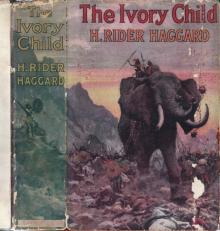 The Ivory Child
The Ivory Child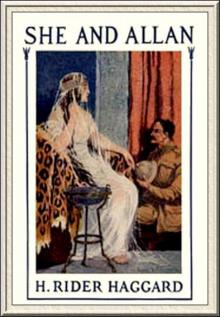 She and Allan
She and Allan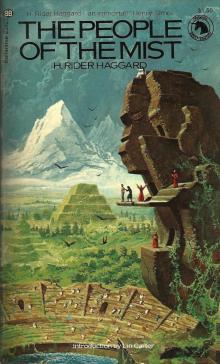 The People of the Mist
The People of the Mist She
She Morning Star
Morning Star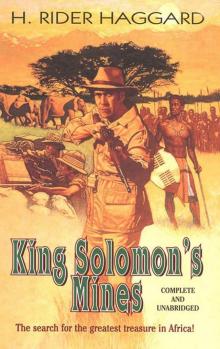 King Solomon's Mines
King Solomon's Mines She: A History of Adventure
She: A History of Adventure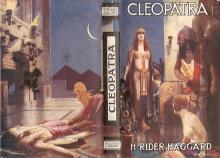 Cleopatra
Cleopatra Ayesha, the Return of She
Ayesha, the Return of She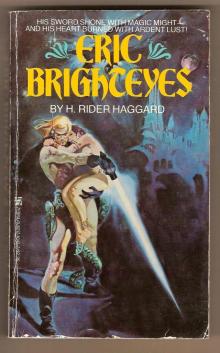 Eric Brighteyes
Eric Brighteyes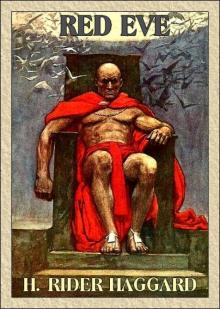 Red Eve
Red Eve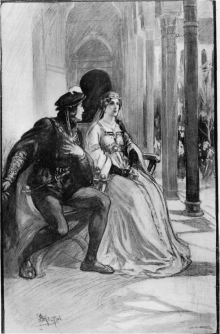 Fair Margaret
Fair Margaret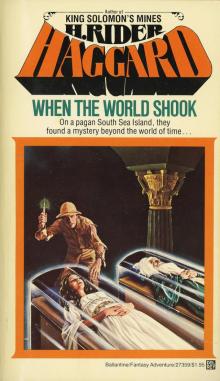 When the World Shook
When the World Shook Lysbeth, a Tale of the Dutch
Lysbeth, a Tale of the Dutch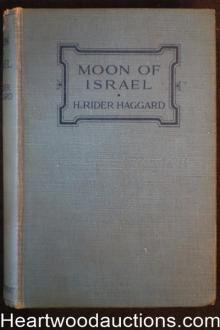 Moon of Israel: A Tale of the Exodus
Moon of Israel: A Tale of the Exodus Long Odds
Long Odds The Ghost Kings
The Ghost Kings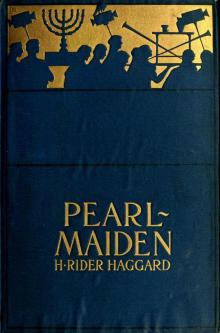 Pearl-Maiden: A Tale of the Fall of Jerusalem
Pearl-Maiden: A Tale of the Fall of Jerusalem Allan and the Holy Flower
Allan and the Holy Flower Smith and the Pharaohs, and other Tales
Smith and the Pharaohs, and other Tales The Wanderer's Necklace
The Wanderer's Necklace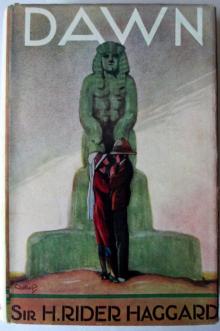 Dawn
Dawn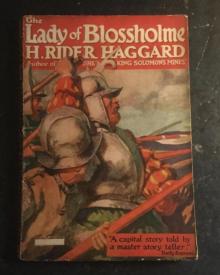 The Lady of Blossholme
The Lady of Blossholme Stella Fregelius: A Tale of Three Destinies
Stella Fregelius: A Tale of Three Destinies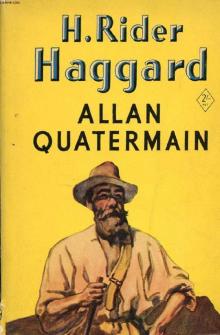 Allan Quatermain
Allan Quatermain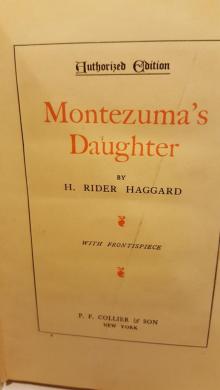 Montezuma's Daughter
Montezuma's Daughter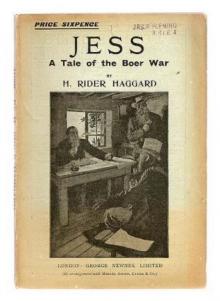 Jess
Jess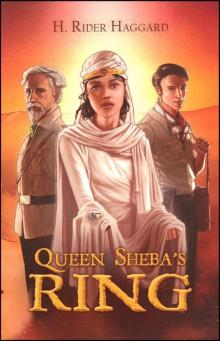 The Brethren
The Brethren Allan's Wife
Allan's Wife Child of Storm
Child of Storm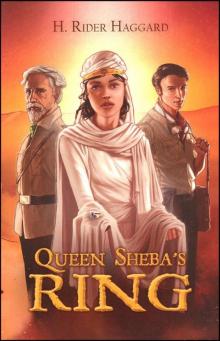 Queen Sheba's Ring
Queen Sheba's Ring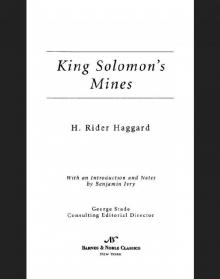 King Solomon's Mines (Barnes & Noble Classics Series)
King Solomon's Mines (Barnes & Noble Classics Series)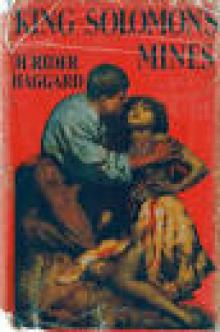 Complete Allan Quatermain Omnibus - Volumes 1 - 10
Complete Allan Quatermain Omnibus - Volumes 1 - 10